#source: asian review
Note
I'm in awe of your posts about the architectural details of MDZS/CQL -- and so grateful. As a fanfic writer, it's really helped me visualize the territory. I'd like to correct one detail... my degree is in Asian Studies with a focus on the spread of Buddhism across Asia. The Southern Song dynasty neo-Confucians laid claim to the lotus imagery, but it is Buddhist, dating back to the Han in China, and further back in India.
Thank you @icarusancalion! For the compliment and your correction💛 It has, quite predictably, lead me down a fresh rabbit hole of research. One, I realise, I should have paid more attention to in the first place.
For others' clarity, I believe this is the passage you're referring to within my Lotus Pier set study:
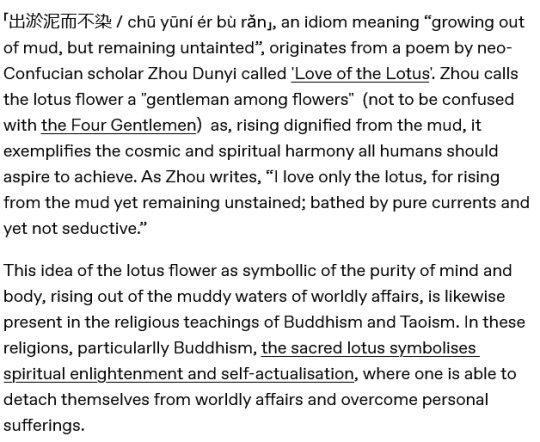
The first passage paraphrases the article linked in the text (and here, for anyone who would like to access it directly now) that talks about Chinese philosopher Zhou Dunyi's work 'On the Love of the Lotus', in which he ties the lotus flower symbollically to what the article calls his 'anthrocosmic vision'. The article further talks about Zhou Dunyi's, or Zhou Lianxi's, "embrace of Daoist and Buddhist notions" and how he was regarded as a controversial thinker: highly influential for his reformation of traditional Confucian ideals, and the later emergence of neo-Confucionism.
I admittedly only focused on the passages relating to the lotus imagery at the time, and didn't consider the context this article (notably: the only source I chose to find on Zhou Dunyi at the time) was laying out with regard to his Buddhist and Daoist influences as a Confucian scholar.
It's also the lack of research on my part that lead to my neglect of mentioning the intricate relationship of these three pillars of religious philosophy in China: Confucianism in earlier dynasties, its sometimes-conflict with Taoism, and Buddhism's earlier introduction to China. (Plus, the growing word count was also a factor.)
And frankly, when it comes to the lotus imagery in particular, I didn't pay Buddhism its due: I was focused on the article regarding 'On the Love of the Lotus', which doesn't actually mention the prevailance of the lotus in Buddhist symbology for the poem's context - although wikipedia, of all places, does. It briefly states that Zhou Dunyi "borrowed from Gautama Buddha's famous metaphor", regrettably without a source. Crucially, though, I was aware that the lotus symbolism had its origins in Buddhism and the Lotus Sutra, as mentioned by the second source cited in the original text, I just clean forgot to mention it, and ended up equally attributing it to Daoist philosophy.
So again, big thank you for your correction and insight 🙏 I'll see that the original post is reworded appropriately, although I can't do anything for the reblogs already out there.
If you have any academic sources/sources with more insight than these articles that could help me or anyone interested further explore this context, please drop them in my ask box 💛 I'm not entirely happy with the credibility of that second source, and new information and perspectives are always welcome.
I wish you the best for your studies! I'm only scratching the surface here, but it seems like a fascinating and expansive specialism.
#i just *clenches fist* love research#always evaluate your sources folks!#and check your own work for broad simplifications and potential inaccuracies#nikkianswers#icarusancalion#peer review#cql set design saga#lotus pier#cql set design#asian studies#history of religion#buddhism#confucianism#taoism#daoism#chinese history#chinese philosophy
5 notes
·
View notes
Text
Tips from a former English major and English TA:
Reading the text actually does help you in the class believe it or not and we can tell when you haven’t read it. Sometimes we’re just too tired to call you out on it. Your awkward silence in class speaks volumes.
That being said, if you don’t have time because life happens read at least two different summaries or analysis pages online. Preferably more. One source will rarely mention everything your teacher asks you about.
Other tricks include reading the last sentence of every paragraph or reading every other page
The reason you’re being forced to take an English class when you’re not an English major is to help you come up with arguments when there’s no strict data set to follow and no one correct answer. If your school allows for alternatives to this sort of category like film analysis or art history that you think you’d like better, take it. The goal of GE classes is to turn you into a well rounded and educated person. Not to torture you.
If you’re reading works in translation and don’t want to take the time to learn the language but you also want to get a more accurate idea of the nuances of the original language, read three different translations of the work and compare them. Reading translators notes and reviews of translations by experts is also helpful. In some more rarely translated works translators notes and reviews may be all you have to work off of.
When you’re writing a literary essay you’re entering an ongoing conversation that’s been going on since writing has existed. A tradition that’s existed since before Aristotle. And you’re just as smart as that guy. Add something to the conversation. Participate. Bigger idiots than you have done it.
Chat gbt is really bad at literary analysis and often gets facts wrong. We can tell when you use it.
Everyone has different levels of understanding of the history of literature even within the professional world. People specialize for a reason. Nobody is expecting you to have read everything. An expert in medieval Irish literature isn’t going to have read the same things as an expert in post-colonial west African literature who won’t have read the same things as a general expert in contemporary Asian literature. Being “well-read” is subjective and means something different to everyone. English classes often show you where to start and how to research stuff related to literature and analysis. Especially if you are an English major it’s easy to get overwhelmed early on but you get used to accepting that you can’t know everything. And that’s fine. Just focus on finding your niche. Or maybe you don’t have one and just want to sample everything. Or maybe you’re just here for general knowledge. That’s fine too.
685 notes
·
View notes
Text

✩🌗⚔️Review:
What this book lacks in world-building it makes up for in the all-consuming enemies-to-relcutant allies-to-lovers plot.
“The Hurricane Wars” follows Talasyn and Prince Alaric, two bitter enemies with opposing magical abilities, as they are thrust into an uneasy alliance to bring an end to the Hurricane Wars. But a greater threat is coming, and the searing passion they find in each other could either save their world or destroy it.
As a huge Star Wars fan, I thoroughly enjoyed Guanzon’s debut novel! I found great enjoyment in identifying connections between “The Hurricane Wars” and the films (7-9) as well as the ways in which Guanzon branches out to build the relationship dynamic between Alaric and Talasyn (inspired by Kylo Ren and Rey). I went feral over the addition of the arranged marriage trope that Guanzon incorporated into her storyline and really like how she infused Southeast Asian culture into Talasyn’s background. I wasn’t originally a Reylo shipper, but Guanzon has successfully converted me.
For readers picking this one up without having seen Star Wars, this book has its pitfalls. The magic of fanfiction is that writers can create an alternate universe where beloved characters that may not have otherwise been romantically attached can get together. Very minimal world-building is needed because the assumption is that the target audience is already familiar with the source material. The problem is that traditionally published novels don’t work that way. Readers aren’t always part of certain fandoms and, in my opinion, “The Hurricane Wars” (part of the fanfic-to-romance pipeline) suffers from assuming everyone is a Star Wars fan. I came into this book with a full understanding of the characters, the magic system, and the conflict. I can see how others who have not seen the films could easily become lost because at the end of the day, the goal of this book is for Reylo to get together, even if it is to the detriment of the world-building, plot, and conflict. I think that is why part I felt so rushed to me. Part I is not as developed as part II because only the bare minimum is done in terms of developing the world and magic system to establish that Alaric and Talasyn are enemies. Part II was much more interesting because that is where the sexual tension, angst, and banter between the characters finally comes into play. It is clear that the romance is what drives this book in comparison to the war that is going on or the magic that is present.
I didn’t mind this, which is why I’ll likely pick up “A Monsoon Rising”. I’m ultimately glad I stuck with this book despite getting bogged down by part I because I absolutely devoured part II. And hey, if this is the book that convinces more people to watch Star Wars, I’m willing to look past its shortcomings.
Cross-posted to: Instagram | Amazon | Goodreads | StoryGraph
#the hurricane wars#thea guanzon#alaric ossinast#talasyn#alunsina ivralis#arranged marriage#enemies to lovers#adult fantasy#adult romance#forced proximity#morally grey characters#dual pov#royal romance#reylo#reylo fanfic#fantasy romance#romantasy#book review#booklr#book blog#book blogger#bookish#book recs
9 notes
·
View notes
Text
OK SOOOOOOOOO pm might've dun fucked
Please remember that:
THIS SITUATION IS STILL IN DEVELOPMENT, YOU WILL HEAR MISSINFORMATION ABOUT IT, EVEN THE VERY BASIS OF IT CAN BE COUNTED AS SUCH.
Note: I WILL be editing this post as the situation progresses so you can stay updated, feel free to pop in every now and then.
Have the offical statements from pm:


no english translation was provided yet HOWEVER pm provided a statement:
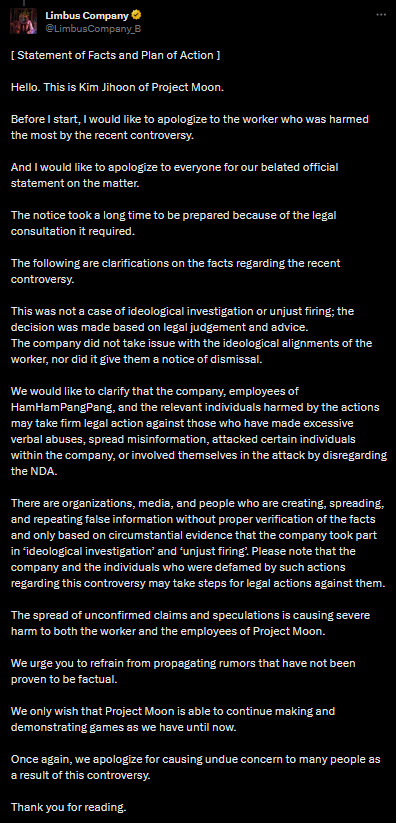
Source: (x)
I have OPINIONS but im not going to voice them here, its not the post. I can say though, they are very negative.
Essencially what you need to know:
Pm fired a CG artist because of their political views relating to a retweet which happened around 5 years ago (the artist is relativley young while being an adult, they looked into the artists past which... taking teenagers actions into account while judging an adult should only happen when the teen commited terrible crimes) due to them getting a lot of hate from the korean side of the community which apparently spiraled from them getting a wetsuit ish and not a bikini ish among other things like update direction. And yes, it started on an incel forum, at least screenshots say so.
The political views are centered around feminism which is viewed negativley in south korea due to their extreme views and actions. If you want to see their state or mind when it comes to feminism, check the tumblr post made by: @fatestayyuri on this situation.
All 3 games are being currently review bombed by angry korean fanbase and by the angry western fanbase
Evidence of death threats given to PM are given out in a comment made by @worthy-opponents as well as the stance of the attacking group.
(I apologise about putting it in the wrong section yet again, this situation is going off like hell and I can barely keep up weeding out actual useful information out of the useless shite, will take the blame tho, ain’t trying to wipe the blame or anything, again sorry if I insulted you in any way that wasn’t my intent)
Note and edit: the original target of the cyberbully attack was the artist who was actively responsible for drawing the ish wetsuit artwork, however upon discovering the artist is male, the attack switched to Vellmori due to her deleted feminism driven retweets. The lack of sexualisation of wetsuit ish is seen as radical feminism by the group who decided to start such an attack. Which is why they decided to target Vellmori. Note. These retweets were deleted around 3 years ago and recovered using the wayback machine.
Another note: there is no winner in this situation, the group did threaten project moon with physical violence if they did not remove Vellmori. PM already had to deal with death threats from the Asian fanbase before when LoRs ending happened if you remember that situation. They didn’t want to risk actual physical harm to their employees. I am only stating the information as I find it not trying to influence your view on the situation. I just want you to make a rational decision.
Yet another note: The biggest PM server on discord went into lockdown due to spreading misinformation.
Important:
There is an actual hate campaign against Japanese artists who support PM:
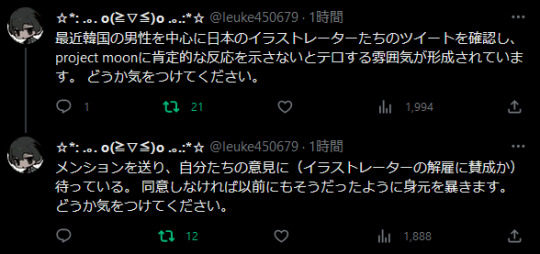
There might be a possibility this will keep on spreading into other Asian countries. If you have any friends from such, inform them.
Image of the protestors right in front of the PM office:
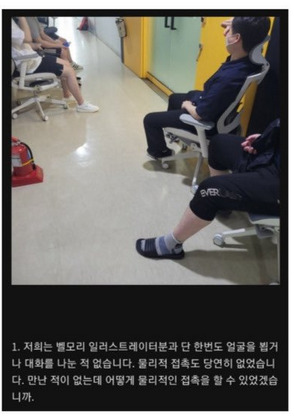
Source: (x)
Currently theres a fundraiser for a truck with a screen that will display a protest messege regarding the termination of Vellmori, it's a form of peaceful protest in south korea. Source: (x)
project moon fired Vellmori through a phonecall (illegal) as well as did so on the spot without giving her the necessary notice. Source: (x)
Worker unions got into this situation, as well as limbus ended up in newspapers. Source: (x)
Statement from the Digital Content Creation Working Association:

Source: (x)
A fundraiser which will potentially go towards Vellmori (x)
Turns out Jihoon is a very strict and emotional CEO, source and more on here (x)
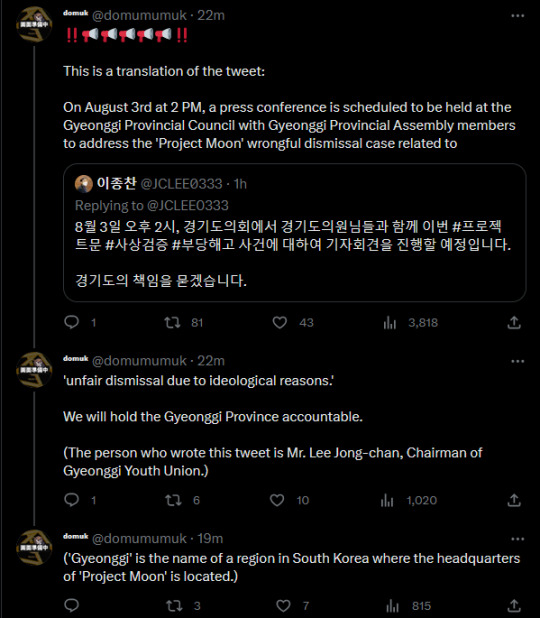
(x)
Theres currently a bunch of hashtags made on twitter to bring the opinion of the fanbase to PMs attention. These tags are (but not limited to): #PM_FaceTheTruth, #PM_unfairdismissal. Previous hashtags included: #Projectmoon_unfairdismissal_Protests, #Truck_Protest_Against_Unfair_Dismissal_of_ProjectMoon. There were many more, an account that started these hashtags as well as the organiser of the truck protest: (x)
Potential missinformation:
death threats right in front of the pm office from the angry fans
concerned fans visiting the office to ask for the wellbeing

Complete misinformation:
Vellmori being a terf. It’s a misinformation campaign targeted specifically to the English part of the fanbase because of the feminist retweet’s.
Mili and Studio EIM cut contact with PM
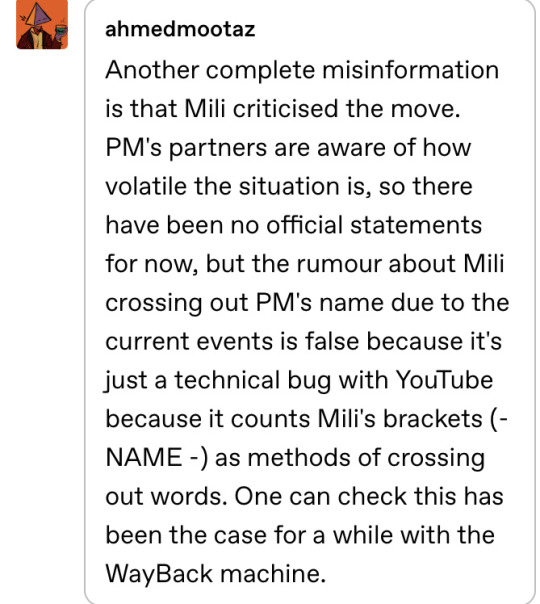
Thank you to: @ahmedmootaz for the information in the screenshots!
Link to the official status here:
https://twitter.com/LimbusCompany_B/status/1683854709046808576
IF ANY OF YOU HAVE ANY INFORMATION, EITHER POST IT WITH A WARNING ABOUT POSSIBLE MISSINFORMATION OR COMMENT!
30 notes
·
View notes
Note
"great discussion"? dude you just went off on someone who was simply sharing their enthusiasm about the kin and the game. you didn't need to go all redditor-debate-king on their ass and act like your response is a peer-reviewed academic paper. you took his response to your friends, tore it apart, and then came back to tumblr to act self-righteous about it.
oh you're so silly aren't you! when i said "great discussion", i meant it. heartily, fully, like i would have told a friend after a debate in philosophy class. i like that we're able to discuss these things. and i'm glad this reblogger came to me with their opinions, because it was (as far as i can recall) the first time someone brought up the Kin being any way a "careful" depiction of real-life cultures. i've repeated many manyyyyy maaaany ways in my reply that it is far from what i've heard from most people, from most indigenous people in this fandom. the fact that tone does not carry through internet back and forth is not my problem. and the fact that you are reading haughtiness or self-righteousness in it where it is not, is yours.
i took the reply to my group chat because there are central-asian indigenous people in this damn chat, who i assumed would know more + have other opinions that the replier, because. you know. the Kin is inspired by their peoples. and i wanted their opinion on it, because, you know. not mine.
you are assuming i'm taking issue with someone's appreciation of the Kin. i am not. i appreciate the Kin. i love the Kin. I love the Herb Brides, goddess bless. I always want people to love them, to be kinder to them. this is one of the reasons i reiterate myself that the main opinion that i've seen around the Kin is that it is mishandled. and i reiterate this because i (and many other people) want to recognize how the kin is mishandled. pretending that "oh you're just mad at someone being appreciative of the kin" was my take is bad-faith. you can be appreciative of the kin and recognize its mistreatment. you will have to. going "pointing out the racism in the narrative that has been multiple times talked about by the people it directly impacts is ruining people's fun actually :(" is a braindead take. just dust between those two ears my love.
i don't go on reddit for my own sanity. i didn't "act like [my] response is a peer-reviewed academic paper", it was the ramblings of someone who does research about things out of autistic fun and the tldr of multiple discussions i've had in this group chat, formatted like shit, no sources just vibes, and i've never claimed it to be anything else! i assume that when all you do is be on reddit, every lengthy person reads like a redditor.. i hope you're not taking Humanities in college.
you are making up imaginary things about me that straight up don't exist in the source material (or my own words) to be mad about, misconstructing my internet ramblings for something they are not, and applying bad-faith readings to my group chat's discussions because you don't like being told dissident opinions. i loved reading the replier's take, and am glad people are digging deeper into the cultures they're inspired by. Your bad-faith reading of what is ultimately Me Blogging and Being Lengthy Because I Read Shit For Fun (like a NERD! like some kind of... NERD!!) and out of autistic hyperfixating makes me believe you would be torn to shreds in any academic context worth their salt, even though my blog is not one. you shall be turned into dust!
#you are not making it out of junior high english courses.#ring (blabbers)#you're goofy as shit. if i wanted to make an essay i would. i've studied literature i can put together a mean essay. but it's my blog.#if you're trying to read debate-king redditor levels in it; well. i'm so sorry you were never passionate enough about something#to do research. also slightly worried. hope you're well!
20 notes
·
View notes
Note
I saw your yesterday comment about occupation of Palestine land by isreal with the help of uk and usa.
Do you read history on social media or books ?
Israeli live there before islam come in existence.
Islam came in existence in 610-613AD.
"The promise land" 1500-2000BC.
so that land belongs to both that's why they got 2 nations.
And if you think there should not be Israel because of Palestine.
With this logic, in Europe almost 15 countries will be vanished because they got their name after separation from Russia.
With this logic south Asian countries like Pakistan and bengladesh should not exist or INDIA should capture them.
In EAST ASIA , china should capture Taiwan.
And a lot more.
War is always worst for humanity.
But in War, only powerful Win.
" you pet a snake in your backyard and you think it will only bite your neighbours, that will never possible"
I wish you read more than making unnecessary noise on the internet with half knowledge
I'm genuinely curious, how old are you and what is your educational background?
What you're spouting here is Israeli and American propaganda/indoctrination.
Reminder: 'Israel' did not exist until 1948. Great Britain and the United States CREATED a space for Israeli settlers on Indigenous Palestinian land post World War 2. Palestinian people were there for a LONG time before Israeli's settled, displaced hundreds of thousands, and murdered tens of thousands of Palestinians if they did not leave (this is referred to the Nakba of 1948). This is a literal historical fact.
And you're asking me where I'm receiving my information? I have a Master's degree with a research background. If I'm ignorant about ANY topic I look into it extensively and properly. Making sure the sources I am looking at are reflexive and peer-reviewed and un-biased. And talk to experts when I can.
And the histories of the different countries you listed have completely different contexts. You can't convolute this with what has happened and is happening to Palestine. Because most of those regions separated from the major power/government in control to gain their sovereignty. What is not clicking here? The very existence of Israel has colonialist and imperialist roots. Israel isn't fighting for their independence from Palestine. Palestine was forcibly settled upon.
And wars are mostly started in the name of what? There's so much to unpack in a sentiment like that, but when a government has literal weapons of mass destruction and they're using it to suppress, oppress, and enact terror and genocide on another city or country who don't have near the capacity to defend itself then this is just unilateral violence. You act so flippant about the nature of war like "only the powerful win" as though wars don't devastate and destroy many people's lives and homes and entire communities.
Your comment has some of the most crass rhetoric I've read for the past 24 hours. Congratulations.
And also, while we are at it -the reason why American Christians support Israel is because they believe that if they save this 'holy land,' Jesus will return and if Jewish people do not convert to Christianity they won't see the pearly gates.
Again, all historical facts. Maybe you should dedicate more time to reading books and journal articles by Palestinian authors first, and then anti-Zionist Israeli Jewish people.
19 notes
·
View notes
Text

(This post will contain mild spoilers for Yellowface. There will also be brief mentions of racism.)
Yellowface was a breath of fresh air!
Hello, welcome, it’s been a while, hasn’t it? I honestly thought this blog would be abandoned to inactivity until now when I received renewed vigour to write for it. The cause is simple, really. I finally found another book I thought was worth talking about regarding its portrayal of women.
Now this may surprise you but we don’t particularly enjoy expelling negative energy on books. We started this blog out of a naïve hope that perhaps we would be put in touch with like minds and find books that speak to us. Fast-forward a few years on and that hope was dashed. My co-partner had grown busy with other pursuits and equally had few words to speak on anything literary, and we packed up this blog prepared never to update it again.
That is, until, my saving grace came in the form of a most unexpected source.
I had heard whispers of Yellowface prior to its publication but I admit after reading its premise and a few advanced reviews, it didn’t seem like anything I would be interested in. How it pleases me to be wrong in this instance! And to have taken a chance after having seen a few friends speak its praises. The premise to Yellowface is a simple one: set in a contemporary America, Juniper Hayward steals the manuscript of her deceased Asian female friend and passes it off as her own, and this callous act of self-serving ego rockets her to stardom.
Juniper Hayward is one of the best female protagonists I’ve read in quite a long time.
Before I continue, I want to make a few things clear: Juniper Hayward is no feminist icon. She is racist. She is egocentric, prideful, catty, self-interested. She is, in all respects, the villain of the story and the orchestrator of her own misery. And yet… and yet… she compelled me. She reflected an ugly side of being an artist I longed to see portrayed by a woman. While she is the furthest thing from an aspirational and awe-inspiring individual she was so startlingly human, so flawed, so hungry, that I couldn’t get enough of her. I devoured Yellowface in the span of two days and afterwards I was left utterly enthralled by Juniper and Athena both and their parasitic, competitive friendship.
Deep down, I’ve always suspected Athena likes my company precisely because I can’t rival her. I understand her world, but I’m not a threat, and her achievements are so far out of my reach that she doesn’t feel bad squealing to my face about her wins. Don’t we all want a friend who won’t ever challenge our superiority, because they already know it’s a lost cause? Don’t we all need someone we can treat as a punching bag?
This is the sort of representation I was looking for! Women who are deeply driven by their own want and ambition, compelled to succeed until it takes them to unprecedented heights (or leads to an almighty fall). I truly commend Kuang for bringing these women to life, setting them in a book filled with equally dimensional and awful female side characters, with nary a prominent male presence to be found unless they serve the narrative. It was a genuine pleasure to read about Juniper and her desire to be recognised for her writing accomplishments, to create and leave something behind that was bigger than herself:
A musician needs to be heard; a writer needs to be read. I want to move people’s hearts. I want my books in stores all over the world. I couldn’t stand to be like Mom and Rory, living their little and self-contained lives, with no great projects or prospects to propel them from one chapter to the next. I want the world to wait with bated breath for what I will say next. I want my words to last forever. I want to be eternal, permanent; when I’m gone, I want to leave behind a mountain of pages that scream, Juniper Song was here, and she told us what was on her mind.
Juniper Hayward is a protagonist on par with Humbert Humbert. A loathsome figure full of pitiful self-excuses and delusional rationalisations for the wrongs they commit. You feel disgust with them, you feel for them, you yearn to understand them, but what you can never do is ignore them.
Plagiarism is an easy way out, the way you cheat when you can’t string words together on your own. But what I did was not easy. I did rewrite most of the book. Athena’s early drafts are chaotic, primordial, with half-finished sentences littered all over the place. Sometimes I couldn’t even tell where she was going with a paragraph, so I excised it completely. It’s not like I took a painting and passed it off as my own. I inherited a sketch, with colors added only in uneven patches, and finished it according to the style of the original. Imagine if Michelangelo left huge chunks of the Sistine Chapel unfinished. Imagine if Raphael had to step in and do the rest.
And what I love most is that, penned by an Asian woman like Kuang, there is no chance for Juniper to escape accountability for her vile misdeeds. The author holds her up in all her contemptible glory, with no veneer of justification to be found, and invites you to observe and cast your judgement. She tapped into the gnawing resentment that eats away at every writer in the publishing industry, each of us all clawing for the scraps of recognition those at the table see fit to toss our way until we all turn on each other. Why her? Why not me? Is it because I am not pretty enough? Not charismatic enough? Am I simply too blandly white and heterosexual? Am I simply too unpalatable for the masses? On and on it goes, the gears turning, powering the engine of jealousy until it churns out a monster like Juniper.
The attacks on the publishing industry and how it commodifies and weaponises identity to serve capitalist interests were particularly salient and incisive from Kuang, I like how she tackled both sides of an argument, exposing both of their respective shortcomings, and left no one unscathed.
She’s done this in all her other novels. Her fans praise such tactics as brilliant and authentic—a diaspora writer’s necessary intervention against the whiteness of English. But it’s not good craft. It makes the prose frustrating and inaccessible. I am convinced it is all in service of making Athena, and her readers, feel smarter than they are.
But best of all, I loved how much the story was so singularly focused on Juniper’s ambitions. There was no looming romance in the background threatening to infringe on the narrative. Juniper never took the chance to lament her lack of a traditional lifestyle, if anything, she scorns it.
I couldn’t stand to be like Mom and Rory, living their little and self-contained lives, with no great projects or prospects to propel them from one chapter to the next. I want the world to wait with bated breath for what I will say next.
However, like all books, there are shortcomings. I won’t detail them here as they are not relevant to the nature of this particular post and don’t detract enough from the positives to bear mentioning. All in all, Yellowface was a pleasant and welcome surprise and I heartily encourage people to pick it up if you’re interested in reading about women wallowing freely in their dark sides.
25 notes
·
View notes
Text

A Challenge Every Sunset is run by a group of like-minded AMC IWTV fans, to foster creativity and positive engagement in this burgeoning fandom through events, prompts and challenges.
About and tagging system ►
All events and initiatives ►
Participation guidelines below ▼
Participation guidelines
The show brings to the table sensitive subject matters such as racism, addiction, domestic abuse and sexual violence. While any work of art may be critiqued, we find that the show’s handling of these “delicate” and “dark” topics is overall careful and nuanced, and we believe similar care and thought should be given by fans.
As a general rule, we ask you to keep in mind how your work responds to harmful stereotypes or bigoted tropes, and to be mindful, take due care and conduct your research when tackling sensitive subject matters.
We take a look at all fanworks submitted as part of our events before we share them, and those dealing more explicitly with sexual violence, incest, and pedophilia will likely take some more time to be reviewed, and will only be accepted into collections and/or shared on our accounts if there’s agreement among moderators.
If a given work is not accepted, we won’t contact the creator, but we welcome creators to reach out to us for information. On a case-by-case basis, we might specify the reason for rejection and, if the creator is interested, we might be able to provide more details, resources or feedback.
More specifically, when creating any fanwork —but particularly your submissions to this account’s events— we urge you to keep the following points in mind:
When writing about the Rue Royale era, Creole characters and New Orleans during Jim Crow, make sure to fact-check so as not to fall into ahistorical portrayals. Similarly, consider the material realities of structural homophobia and the heteropatriarchal family in the show’s historical settings. More broadly, keep in mind that white supremacy and patriarchy fundamentally affect every aspect of life, including how we interpret other’s art and the art we put out into the world in turn. And, in general, take care to do research when dealing with specific and potentially unfamiliar contexts —be it the experience of people of color in Europe during and after World War II, the lives of South Asian workers in Dubai, the unfolding of the AIDS crisis, or the practices of Islam, consider whether your work is making a statement that should be grounded in reality.
When writing about Louis, Claudia and other Black characters, keep in mind common stereotypes regarding Black people, such as the “Mandingo” stereotype or the “Sapphire” “Jezebel,” and “Mammy” stereotypes. When writing about Lestat and Louis’ relationship, avoid making Louis a receptacle for Lestat’s emotions, and generally avoid having Black characters only function in the narrative to perform emotional labor for their white partner. And, as this is a show heavily concerned with queerness, we urge you to also take into account common (and inaccurate) ideas that Black people are more homophobic or more ignorant about gender and sexuality. Also consider how you portray Black characters’ anger or aggression, particularly in comparison to white characters.
In general, we encourage you to keep revisiting the source material to make sure your characterization is grounded and true to canon.
In art, be mindful of exaggerating Black characters’ bulk, size, and features in comparison to non-Black characters, and likewise for characters of color in general in comparison to white characters. If in doubt, look up heights and picture references to avoid fetishistic depictions. Also consider how you color art, being mindful not to whitewash Black characters and characters of color, or darken their skin tone in relation to the actors portraying them.
We consider it essential not to lose sight of how moving through the world as a Black girl conditions Claudia's experiences. Though she grows past her physical age, the widespread adultification of Black children is still something to keep in mind when interpreting her character: Black girls, especially darker skinned girls, are consistently seen as less innocent, more mature, less vulnerable to pain or hurt, angrier, and more calculating in their actions than their white peers.
Remember that Armand is played by a South Asian actor —be wary of conflating being muslim with being Arab, and keep common anti-Asian, islamophobic and orientalist stereotypes in mind. Because Armand’s backstory hasn’t been revealed yet, and it seems safe to assume his forced conversion will remain a plot point, you may take different approaches regarding Armand’s faith. That said, we are likely to reject scenarios in which Armand originally comes from a christian background.
The text of the show deals with abuse and sexual violence. It presents common misconceptions about abuse, particularly domestic abuse, and problematizes them. When writing about the relationships in the show, and particularly the canon plot, we urge you to consider how words specific to abuse are used —terms such as “gaslighting”, “love-bombing”, or “mutual abuse”— as well as common victim blaming rhetoric and abuse apologia (they didn’t mean it, they feel terrible about it, they were forced by circumstances); and to keep in mind established frameworks to think about abuse such as DARVO, and the harmful and widespread ideas about fake accusations of abuse.
In general, we discourage any canon-compliant (or canon-adjacent) scenarios in which Lestat “didn’t actually” or “didn’t really” abuse Louis and Claudia, “it wasn’t as bad”; it was “more equal” than we’ve seen, etc. or in which Louis and/or Claudia were the real victimizer/villain. Likewise, we suggest avoiding scenarios erasing or minimizing Armand’s actions in Paris. This type of content is likely to be outright rejected.
When adding tags and warnings
We think that tags and warnings are essential to ensure that the fandom experience remains enjoyable and safe for all of us. If you want the fanworks you create for an event to be shared on our accounts, make sure that you are tagging or describing your work accurately —we consider that vague tags such as “dark content” or “Dead Dove Do Not Eat” on their own are not sufficient enough to warn readers of the subject matter.
If we believe that a particular submission could be potentially triggering, we might choose to share it with added warnings of our own, be it in a reblog or tags.
Immortal children and the “Underage” warning
In the case of fics in which Claudia is chronologically an adult, we strongly recommend not using the “Underage” warning for her relationships. We consider it’s important not to dilute the weight of the warning, and encourage you to reserve it for fics in which the underage character in question is chronologically, and not just physically a child. This doesn’t preclude that you might want to add additional tags or notes with more detailed content warnings if your fic features a character who’s physically a child in a relationship with someone who’s physically an adult, but we encourage you to keep the standardized AO3 tag for “actual” children.
Other considerations
Some specific subjects and tropes that are likely to be outright rejected include:
Prison AUs
Slavery AUs
Whitewashing of any character
Raceplay and racist fetishization
Explicit child sexual abuse
Parodies of other fanworks that are identified as such will be rejected. If you believe an accepted submission is a parody of another work, please reach out so we can look into it.
Rules of engagement
Participation in a fan event isn't a need, and running this account isn't a public service. As moderators, we reserve the right not to engage with any message, comment, post or account; at our sole discretion and with no obligation to provide explanations regarding our decision to do so.
This doesn’t mean, of course, that we are completely closed off to conversation.
If your submission to our collections was rejected, if we haven’t shared your post, or if you have any question about this account, please feel free to contact us —just keep in mind that we might decline to answer. Requests to keep our correspondence private will be respected, as long as we aren’t sent hate speech or harassment.
What does reserving the right not to engage mean?
Fanworks or posts whose content we do not feel comfortable endorsing will not be shared on our accounts or added to the AO3 collections that are created for this account's events.
Messages or comments which we find to be hostile or in bad faith will be reported and/or blocked.
Accounts that we do not feel comfortable interacting with may be blocked as well.
Still, we would like to clarify that it’s not always possible for us to thoroughly review a “rec list” with many fanworks, and we don’t necessarily endorse every item included in such a post when we share it. Likewise, some of the content from our earlier events might have been accepted/shared while we were still figuring out our criteria for moderation, and might skirt the line of what we’d consider acceptable right now. If we become aware of such a case, we might remove the entry after the fact.
All events and initiatives ►
About and tagging system ►
6 notes
·
View notes
Text
When I was looking for a book to give my husband last Christmas, my local bookseller recommended "She Who Became the Sun" by Shelley Parker-Chan, based on other books he has enjoyed (historical fiction with strong female protagonists, Asian travel and politics). It looked like a good fit:
In 1345, China lies restless under harsh Mongol rule. When a bandit raid wipes out their home, two siblings must somehow survive. The boy despairs and gives in. But the girl resolves to overcome her destiny. So she takes her dead brother's identity and begins her journey. Can Zhu escape what's written in the stars, as rebellion sweeps the land? Or can she claim her brother's greatness - and rise as high as she can dream?
However, he didn't seem that interested at first and the book languished on the side table for months. A couple of weeks ago though, he took it with him on a trip to Egypt and came back raving about how good it is, saying he couldn't put it down and wanting to know if there is a sequel. (Side note: He of course couldn't bother to google for a sequel himself.)
Anyway, in my search for a sequel (yes there is one) I discovered several things about the book which a) make me rather surprised that my husband loved it so much and b) make it appropriate for a tumblr rec so here you go (info from various internet sources, I haven't read it myself):
It's queer. Like, that's basically the entire premise of the novel. The protagonist is AFAB, genderqueer, and marries a woman, and the story is about her navigating both her society and her internal landscape through the lens of gender.
There is a gay subplot between a eunuch and another man. (AO3 authors are already on it.)
The author Shelley Parker-Chan uses they/them pronouns.
Turns out it is also in the fantasy genre, with some magical elements.
Now, it is not being marketed that way at all. Look at the summary above from the cover. There is no indication whatsoever that any part of the story is LGBTQ+, or any mention of fantasy. It looks like a straight historical fiction. It's received awards and gotten lots of great reviews though, so if you're looking for a highly acclaimed queer read this summer, maybe check this out. And I'm going right now to order the sequel!
#book rec#she who became the sun#not sherlock#swissmister#the gay agenda#buy local#i was surprised because he is generally wholly uninterested in LGBTQ+ content#although admittedly he also loved The King's Affection on Netflix#but that's not really the same because there's no gay#and the protagonist isn't genderqueer#just has to pretend to be a man for a while#but fully identifies as a woman
20 notes
·
View notes
Text

By: Ian Rowe
Published: Sep 14, 2023
Imagine you are twelve years old and your public-school teacher asks you and your seventh-grade classmates to stand side by side in a line. The instructor lists a series of personal attributes and says that you must take an action based on your alignment with a particular attribute, to demonstrate either your privilege or your disenfranchisement:
“If you are white, take two steps forward. If you’re a person of color with dark skin, take two steps back. If you’re black, take two steps back.”
This exercise, part of what is called a Colorism Privilege Walk, actually occurred at public schools in Evanston, Ill., and at many other schools across the country. According to the lesson plan, the goal was for white students to “learn more about white privilege, internalized dominance, microaggressions and how to act as an ally for students of color.” In other words, the point was to reveal the real sources of a person’s privilege: the unearned benefit of being white over the intrinsic victimhood of being nonwhite.
Because of these student Privilege Walks, and since the district had also conducted professional-development sessions that divided teachers by race, an Evanston teacher and the Southeastern Legal Foundation filed a lawsuit accusing Evanston School District 65 of violating the 14th Amendment’s equal-protection clause and Title VI’s prohibition on discrimination at federally funded educational institutions.
In all likelihood, these racially divisive practices in Evanston will be found legally impermissible — especially given the Supreme Court’s decision deeming race-based affirmative action unconstitutional in college admissions. Yet across a country now transfixed by the pursuit of equity, there is an obsession with determining what factors drive economic inequality and whether a person is inherently privileged or inherently oppressed based on a single characteristic, most notably race.
Against this backdrop, enter economist Melissa Kearney, who has done America a great service by publishing The Two-Parent Privilege. Kearney unequivocally states: “Marriage is the most reliable institution for delivering a high level of resources and long-term stability to children. There is simply not currently a robust, widespread alternative to marriage in US society.” In terms of benefits to children, not all family configurations are the same. Throughout the book, Kearney posits the necessary caveat that no person should remain in an unhealthy or violent marriage, but she makes plain the case that a married, two-parent household is generally superior to alternative arrangements such as cohabitation and single parenthood.
Rather than resort to making a moral or religious argument for marriage, Kearney, an MIT-trained economist, is determined to “bring the social science evidence on family structure from the obscurity of academic journals into the public conversation.”
Kearney simply sticks to the facts and makes an overwhelming data-based case that marriage and stable two-parent families matter monumentally to the life prospects of children — far more than the usually invoked suspects of race and gender. According to Kearney, in 2019, “77% of white children and 88% of Asian children lived with married parents. The share among Hispanic children was 62%. Only 38% of black children live with married parents — a historically low share that reflects a downward trend over four decades.” With such huge differences in family structure by race, how can one not fairly conclude that family-structure disparity is the greatest driving force behind racial disparities in education, crime, and virtually every area of concern for kids growing into young adulthood?
Indeed, Kearney surgically lays out the new dividing line in America’s quest for upward mobility:
There has been a massive widening of the family gap, such that a two-parent family has become yet another advantage in life enjoyed disproportionately by the college-educated class. The decline in the two-parent family among parents without a four-year college degree is a demographic trend that should concern anyone who cares about the well-being of children and about widespread economic opportunity, inequality, and social mobility in America.
One can only hope that during this election season presidential contenders emphasize how crucial healthy marriages and two-parent households are as the foundation for achieving virtually every social or economic policy objective. They would be wise to follow several of the policy recommendations in Kearney’s book, including, most notably, improving the economic position of non-college-educated men so that they are more reliable marriage partners and fathers. But Kearney recognizes that policy alone will not solve the problem. She strongly argues for a cultural shift that fosters a norm of two-parent homes, in part by simply being open and “honest about the benefits that a two-parent family home confers” on children.
In reviewing Kearney’s prescription, my only wish is that she had spent more time in two areas: (1) advocating that marriage and family structure become a standard data category through which child outcomes are analyzed, especially in education; and (2) identifying strategies to engage the rising generation to think differently about their decisions when it comes to the timing of their own family formation.
In regard to the former, the National Assessment for Educational Progress (a.k.a. the Nation’s Report Card) reports reams of educational data disaggregated by race, gender, geography, and other usual-suspect categories. But family structure is not one of them, despite the paramount role that marriage plays in influencing achievement gaps.
Including family structure could create opportunities to implement different types of interventions that could improve life outcomes for the next generation. For example, at Vertex Partnership Academies, the virtues-based high school I launched in the Bronx in 2022, in a class called Pathways to Power we teach the data associated with the “success sequence.” This is research that shows that the vast majority of young adults who graduate from high school, get full-time jobs, and marry before having children reach the middle class by their early 30s. Young people deserve to know this information, especially when they live in environments where most neighboring families have not followed that sequence.
* * *
In May 2001, writing for National Journal, Jonathan Rauch noted that, “according to Census Bureau data, a two-parent black household is more likely to be poor than is a two-parent white household, but both are far less likely to be poor than is a mother-only household of either race. In other words, if you are a baby about to be born, your best odds are to choose married black parents over unmarried white ones.”
Rauch was highlighting then what Kearney so effectively illustrates now, that in economic terms a parent’s marital status has displaced race and class as a primary driver of child poverty and upward mobility.
And perhaps this message is finally getting through. For evidence, look no further than a four-minute video titled “If someone doesn’t understand privilege, show them this.” Across Facebook, YouTube, Twitter, and several media platforms, it has been viewed more than a staggering 125 million times. It captures another Privilege Walk, but in this case the personal attributes being presented are markedly different from those posed in Evanston.
The first two directives are: “Take two steps forward if both of your parents are still married. Take two steps forward if you grew up with a father figure in the home.”
In Kearney’s final chapter, she warns that “if millions of American children miss out on the benefits that come from a two-parent home and if the family gap continues to widen” then “children will suffer, inequality will continue to widen, and social mobility will erode.” It does not have to be this way. If we are brutally honest in accepting Kearney’s analysis of what truly privileges children, we know what the next steps forward should be.
[ Via: https://archive.md/F4YE8 ]
--
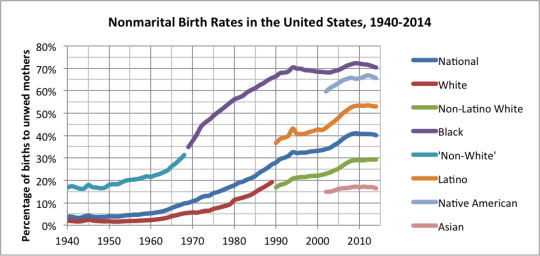
[ Source: Wikipedia ]

[ Source: Mother Jones ]
==
Stop blaming things on "systemic" -isms. There are often known or contributing factors at play, and refusing to acknowledge or address them is dishonest, not virtuous. It identifies nothing, solves nothing, and only serves to make people feel powerless, who are not actually powerless. Although, perhaps that's the point.
Where two-parent households are not possible, it should always default to joint/shared custody, rather than sole custody, with sole only as a last resort when unavoidable.
Joint custody should be the rule, not the exception
Children Likely to Be Better Adjusted in Joint vs Sole Custody Arrangements in Most Cases, According to Review of Research
The Consequences of Fatherlessness
#Ian Rowe#Melissa Kearney#systemic racism#fatherlessness#poverty#family structure#two parents#two parent homes#two parent family#social science#two parent privilege#religion is a mental illness
13 notes
·
View notes
Text
2023 was a great year for me when it comes The Sims. After a 5-year hiatus, I returned to playing and posting, which has been such a source of enjoyment (and, honestly, mild stress, because TS2!). Although Simblr had somewhat changed during my absence, I’m happy to see so many familiar faces still going strong and keeping it all together, and to meet all the new players breathing new life into the game and the community as a whole. The community’s talent, creativity, ingenuity and kindness is a lovely thing to behold and take part in.
With that being said, I have some goals I’d like to achieve in my game in 2024. I’m not exactly holding myself strictly to account, as this is meant to be a fun hobby and life is stressful enough(!), but it would be nice to get at least one of these done and dusted:
Firstly, and most importantly, enjoy, play and post more!
Set up and start playing the medieval ‘hood that I have been toying with the idea of for the best part of 5 years. The amount of CC to download and organisation involved is honestly putting me off, as my life is full enough of dull administrative tasks, but I know I’d really enjoy playing once the hideous and mammoth task of setup was over. Someone please release that special “medieval starter pack” that was vaguely spoken about a few months ago, so I don’t have to go through this pain? 🥺
Even more administration for this one (boo, hiss!), but I would really like to finish organising my main CC collection once and for all. It is too large and unwieldy and everything is all over the place, which bothers me, but not enough to actually finish doing something about it thus far!
Release follower gifts, whether these be Sims or lots for download.
Begin creation of a second vacation ‘hood for Arcadia Falls. I’m not sure whether I’d prefer a more outdoorsy or Asian-themed destination, but I know that just having the tropical subhood is getting a bit old!
Start creating and releasing Sims-related content on YouTube or Twitch. This has a massive question mark over it, as I’m not entirely sure what kind of content I would make or even the best way to make it, but I am inspired by other creators and their content (especially @kayleigh-83’s speedbuild videos!), and I’d love to participate, even in a small way. Any ideas or suggestions as to what content anyone would like to see from me are welcome!
Now that I see that wall of text, it’s slightly overwhelming, but I’m looking forward to this time next year when I can review this list and say that I at least got one thing done. Fingers crossed! 😅
Thanks again to anyone who has liked, reblogged or even passively enjoyed my posts this year. I wish you a great 2024!
15 notes
·
View notes
Text
5 Sapphic Films to Watch This Pride Month

Carol (2015) directed by Todd Haynes
Films and entertainment remain to be one of the most important platforms for the representation of minorities including the LGBTQIA+ community. Although discrimination has more or less ceased as time passed on since the times of the Stonewall riots in 1969, misunderstandings and hate crimes continue in our modern-day society, and films have served as a source of hope and acceptance for many people. Hence, here are five films that you may watch to feel understood, comforted, and accepted:
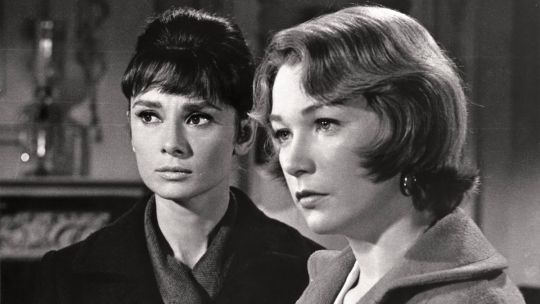
Directed by William Wyler
The Children’s Hour (1961)
Starring Audrey Hepburn and Shirley MacLaine, ‘The Children’s Hour’ shows how much change could happen in your life due to even the slightest rumor of being gay or lesbian. Considering the time this movie was released which was in 1961 before the community was given rights, I could only imagine the amount of impact it could have given someone out there to hear Audrey Hepburn say:
You’re guilty of nothing!
This film clearly depicts the guilt that one feels for being so-called different or irregular from others for finding themselves capable of loving the same sex just as any other person deserves to be loved. This was one of the most heartbreaking endings I've witnessed in cinema, and I may follow up with a separate review for it.
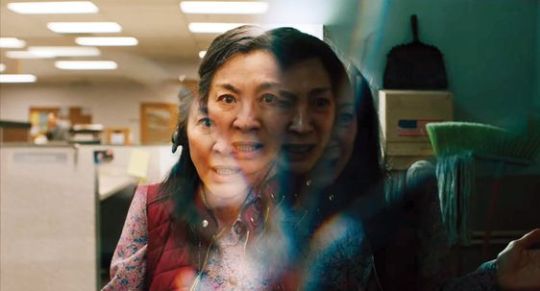
Directed by Daniel Kwan, Daniel Scheinert
Everything Everywhere All at Once (2022)
This film has got to be one of my favorite watches of this year. Not only was it able to take my late-night thoughts about the world and visualize them on screen, but it was also able to depict the hard relationships most kids have with their parents whether Asian, gay, or not.
I’m tired. I don’t want to hurt anymore and for some reason when I’m with you it just hurts the both of us.
It’s hard wanting to love someone that doesn’t accept you for who you are or constantly points out your flaws and denies the person you’ve become, and ‘Everything Everywhere All at Once’ is an action-packed film that makes you ponder more on that thought and how the world cycles around each individual.
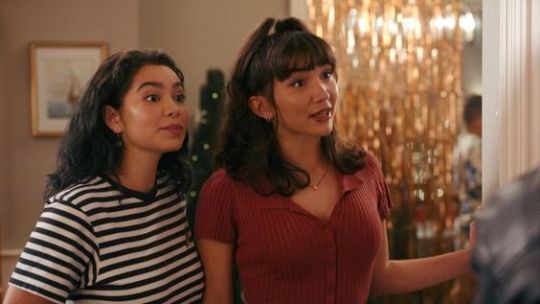
Directed by Sammi Cohen
Crush (2022)
For quite a while now, people have been pleading for a queer film wherein homophobia isn’t the main conflict, and finally, released in the second quarter of this year, ‘Crush’ delivers the people’s desires. Although it is important to spread the realities of queerness and the harassment the community faces, it is sometimes alienating to only witness films that include the same plot of coming out and not being accepted by the people you love most.
'Crush' is set in a world wherein not only are the main characters queer but so are the background or irrelevant characters. It is written just like any other rom-com out there featuring a man and a woman and feeds more into the fact that queerness is normal.

Directed by Park Chan-wook
The Handmaiden (2016)
‘The Handmaiden’ sits at the top of my favorite films of all time, in general, and is because of the plentiful amount of plot twists that had me gaping my mouth and gasping unlike any other film has caused me to do before. This film made by the acclaimed director Park Chan-wook is less of a comforting but rather suspenseful film, and what I love most about it is that he managed to create a story centered around a same-sex love trope without having it be the only and complete plot.
If I were asked what movie I would choose to watch for the first time ever once again, my choice would be 'The Hanmaiden' with no hesitation.

Directed by Céline Sciamma
Portrait of a Lady on Fire (2019)
‘Portrait of a Lady on Fire’ is an Academy award-winning film wherein we witness the loss two people have at freely expressing their love for each other through a beautifully written and directed cinematic sequence. Set in the 1700s wherein their relationship could never have been successful with the lives they wanted to live, we are left to only imagine what could have been if Héloïse and Marianne lived in a different time or if one of them had been a man.
This film allows you to realize the amount of privilege straight people have to be able to love however and whoever they want to, while the LGBTQ+ community is almost forced to keep half of their lives unlived, especially in the prior years of history.
(Click HERE for Writing Commissions)
by Isobelle Cruz, 07/06/2022
#pridemonth#pride 2022#lgbtq#queer cinema#the handmaiden#portrait of a lady on fire#crush 2022#crush movie#the children's hour#audrey hepburn#kim tae ri#park chan wook#sapphic#sapphic films#wlw#wlw film#everything everywhere all at once#daniel kwan#lgbt#lesbian#gay cinema#happy pride 🌈#bisexual
303 notes
·
View notes
Note
Sorry in advance for dragging on the Wes Anderson discourse, and sorry if this is the wrong place to send this!
I am definitely not here to try to defend his honor or something - even as a kid I found it weird how his live action films seem to be filled with white people - but I finally read that Isle of Dogs article you linked and found it… strange.
The author of the article critiques the supposed disregard for the Japanese language demonstrated by the title, when plenty of articles written by Japanese journalists point out it’s a pun referencing a demon island in a well-known folktale. She has also decided that there is a racist stereotype that Chinese people eat dogs, and China is also in Asia, therefore Anderson can’t differentiate between Asians and that the film portrays the Japanese as dog-haters? (It doesn’t.)
The sushi preparation scene appears to be pretty much universally praised, with comments in the youtube clip linked in her article even pointing out cultural details foreigners might have missed, but the author seems to believe the scene portrays the Japanese as “cruel savages”. I don’t know, a lot of the points in the article, at least in its Isle of Dogs part, feel like weird projection.
The more general criticisms – the white savior stuff and not subtitling Japanese – I get, even if I don’t completely agree with them (Tracy felt more like a self-deprecating stereotype of an American busybody who accomplishes very little, and the fallibility and subjectivity of translation is a major theme of the movie. International audiences get the basic dog story with some simple outside exposition, while Japanese viewers also get a ton of extra stuff the core audience is not expected to pick up on.)
Anyway, these articles by Japanese-American journalists convinced me to watch the movie when it came out (they are both also at least somewhat critical of the film, but seem much better informed):
https://www.newyorker.com/culture/cultural-comment/what-isle-of-dogs-gets-right-about-japan, https://www.vulture.com/2018/03/what-its-like-to-watch-isle-of-dogs-as-a-japanese-speaker.html
Don't apologize, I love having these conversations, and you certainly raise very interesting points. I already said what I personally felt watching the movie here.
Here are the articles you sent for those who want to read them, and I decided to do a quick search on my own of Japanese articles.
The Japanese wikipedia article briefly mentions criticism of stereotypes, whitewashing, insensitive (specifically the mushroom cloud) and "English supremacy". Sadly the article linked in the sources no longer exists. Reading reviews I found mixed impressions, but from what I read a lot of people did feel a lot of love for Japan from the movie. The fact that the dogs spoke English was one of the things I found people disliked the most, and I also found several people mentioning stereotypes and in general a bad feeling (as well as people saying it didn't feel like stereotyping). Several people also said it felt more retro than futuristic, but not necessarily as criticism.
That said, everyone praised the stopmotion, which I agree was something impressive. Another thing many people praised was the music (the Japanese drums, the Akira Kurosawa homage).
So yeah, mixed impressions but I'd say more positive than negative.
These are the articles and reviews I read, you can run them through google translate.
#I'm tired it's been a while since I read so much Japanese#best animated movie#ask#not a poll#wes anderson#isle of dogs#about movies
21 notes
·
View notes
Photo

Australianama: The South Asian Odyssey in Australia
Australianama: The South Asian Odyssey in Australia is a research monograph that tells the history of South Asian migration and the "aboriginal" community during the British colonisation of Australia. Concerning Australian social and cultural history side by side, this book is worth reading for its interdisciplinary approach. Scholars, students, and the general public interested in migration and ethnic studies will be benefitted from the book. Australianama proposes a fresh look at the monolingual sources of Australian history. The book narrates the glimpses of travellers who might be able to connect 19th-century Bengal to Australia.
Continue reading...
16 notes
·
View notes
Text
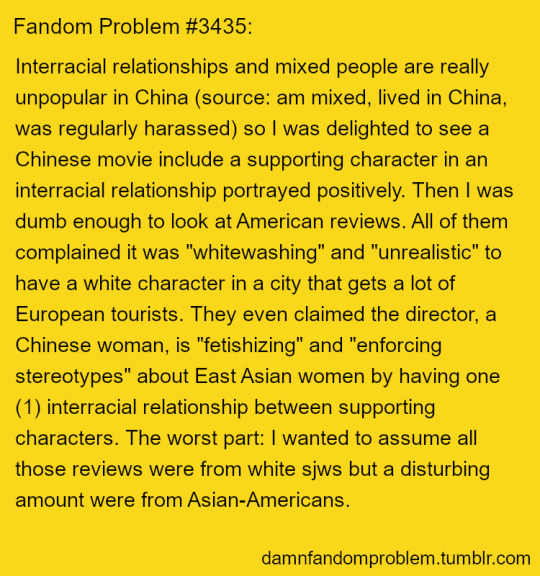
Interracial relationships and mixed people are really unpopular in China (source: am mixed, lived in China, was regularly harassed) so I was delighted to see a Chinese movie include a supporting character in an interracial relationship portrayed positively. Then I was dumb enough to look at American reviews. All of them complained it was "whitewashing" and "unrealistic" to have a white character in a city that gets a lot of European tourists. They even claimed the director, a Chinese woman, is "fetishizing" and "enforcing stereotypes" about East Asian women by having one (1) interracial relationship between supporting characters. The worst part: I wanted to assume all those reviews were from white sjws but a disturbing amount were from Asian-Americans.
93 notes
·
View notes
Text

This paragraph in my Criminal Law casebook caught my eye, so I took a closer look. What follows is one of the most cynical examples I've found of how to lie with citations. Come, walk with me.
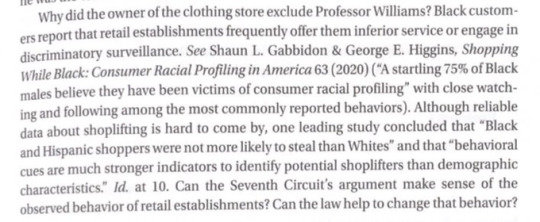
Shopping While Black cites a few studies for its claims about shoplifting, first and most notably the 2016 National Incident-Based Reporting System (NIBRS) data. Noting that "whites comprise nearly 73% of the shoplifting arrests," it emphasizes that "contrary to racial stereotypes, at least with these incomplete data, Blacks do not represent the group most likely to shoplift

This is, ah, a fascinating way of looking at the data. I went ahead and broke the same numbers out to examine per capita rates, which show the same clear trend as is apparent from the unadjusted numbers: there are clear differential shoplifting rates by race.
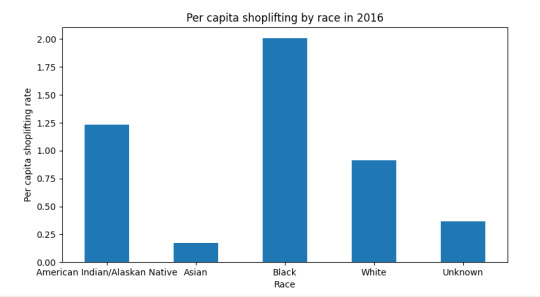
Unsatisfied with this data, the report goes on to look at other studies. It finds a 1997 article with shoplifting records from more than 171 retail firms, providing the following data: Whites (40.81%), African Americans (28.78%), and Latinos (15.78%). The researcher, it says, "provided no explanation for the over representation of Blacks and Latinos."

Thus, lacking explanations that satisfy them from two large datasets that show clear racial trends, the report concludes that "the only real way to determine who really shoplifts is to observe shoplifters and determine if there are any concrete demographic patterns." Apparently, some researchers did this in an Atlanta drug store two decades ago, hiring observers to randomly select and monitor the behavior of shoppers. From this single study in one Atlanta drug store, we find, "contrary to what some believe, Black and Hispanic shoppers were not more likely to steal than Whites."
I'll come back to that study in a follow-up, because I'm definitely not done with it. But let's review: the report found the official crime report sample, in which black people were overrepresented 2x and Hispanic people weren't tracked. Then it found a dataset of 171,000 shoplifting incidents, in which black people were overrepresented 2x and Hispanic people were overrepresented. Finally, it found one study from a single store that claimed no overrepresentation. From that extraordinary series of events, a casebook used by law students around the country draws the citation that "Black and Hispanic shoppers were not more likely to steal than Whites."
Source: Aspen's "Criminal Law: Cases and Materials, Eighth Edition", whose authors would resign from the academy in disgrace if they had a shred of dignity left.
With that out of the way, let's examine "Who Actually Steals?", the single 2004 paper in Justice Quarterly on which rests the entire assertion in law casebooks around the country that shoplifting rates do not differ by race.
How did it work?
First: they set up CCTV cameras at one Atlanta store visited by a racially diverse population. Then they got observers to follow every third shopper "dressed in a fashion that afforded the individual a reasonable opportunity to conceal merchandise," sorting out people who did not touch store merchandise or who wore tight-fitting clothes. From there, they noted who shoplifted and gathered data.

The demographics within 3 miles of the store: 79.8% white, 18.9% black, 2.3% Asian, 4.2% Hispanic.
So: What were the demographics of shoplifters at the store?
49.7% were white, 33.8% were African American, 13.2% were Hispanic, 2.3% were Asian, and 1% were in another group. So far as I can tell, they discerned this visually from CCTV footage.

Not particularly equal numbers. So--how, precisely, did they get equality from this? They explain!
"Disturbed by this racial inconsistency in the demographic profile of the shoppers across data sources, we again returned to the store to more precisely estimate the descriptive characteristics of those persons entering this particular store location. [...] On comparing these two data sets, we found the race of the shopper to be the only variable for which any proportional inconsistency was observed. [...] We adjusted for the undersampling of whites and the oversampling of blacks and Hispanics by weighting each person by the inverse of the probability that he or she would have been included in the sample."
I'll simplify: because the sample of shoplifters they saw had more (visually identified) black and Hispanic people than it did white people, they manually weighted the sample to be proportionate by race.
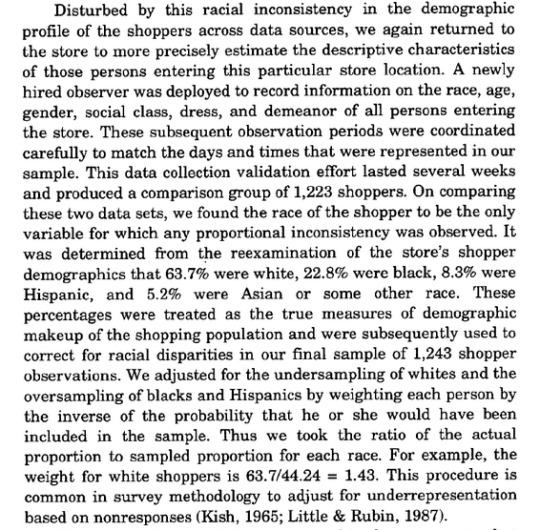
Finally, here are their baseline findings: a simple uncontrolled analysis finds that a disproportionate number of shoplifters were "male, black, Hispanic, between the ages of 35 and 54, low or working class, displayed suspicious cues, failed to make a purchase, or shopped during the summer months."
Unsatisfied with this, they ran a logistic regression that successfully adjusted out the findings that males are more likely to shoplift than females, black and Hispanic shoppers than whites, whites more than Asians, and young people than old people.
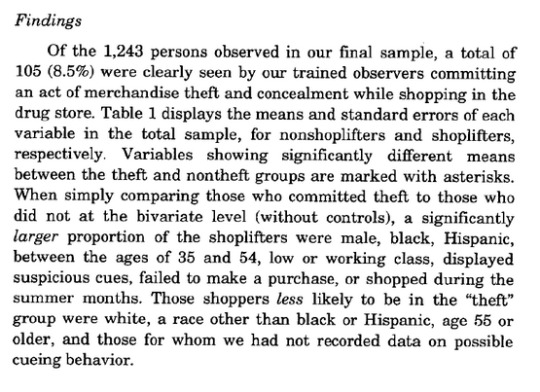
Those are the findings. That's it.
Zoom all the way back out: From visual observation at one Atlanta store in which more black and Hispanic people shoplifted than white people (who in turn shoplifted more than Asians), more men shoplifted than women, and more young people than old, cancelled out by bizarre regression techniques until all these cues were blurred, Shopping While Black draws the line "Black and Hispanic shoppers were not more likely to steal from whites," in a section that mentions nationally representative data that tells the same story as the unadjusted data from their own study.
From that, my casebook picked out that single line, pairing it with a mention that shoplifting data is hard to come by. And now every law student who reads Aspen casebooks gets to nod along as they learn that shoplifting data is hard to come by and doesn't show any racial disparities.
To be clear, this is not stupidity. Nothing like this happens by accident. It is citational malpractice on a ludicrous scale, performed by people who care far more about politics than about truth. It is nothing short of naked propaganda.
(PDF) Who actually steals? A study of covertly observed shoplifters (researchgate.net)
2 notes
·
View notes